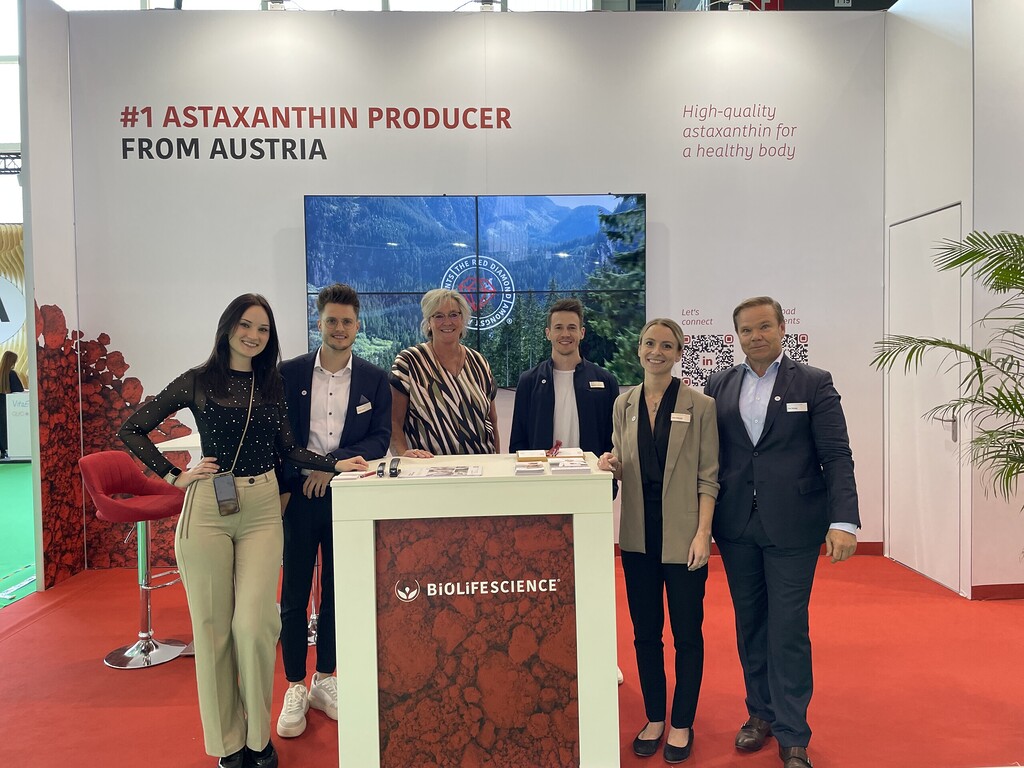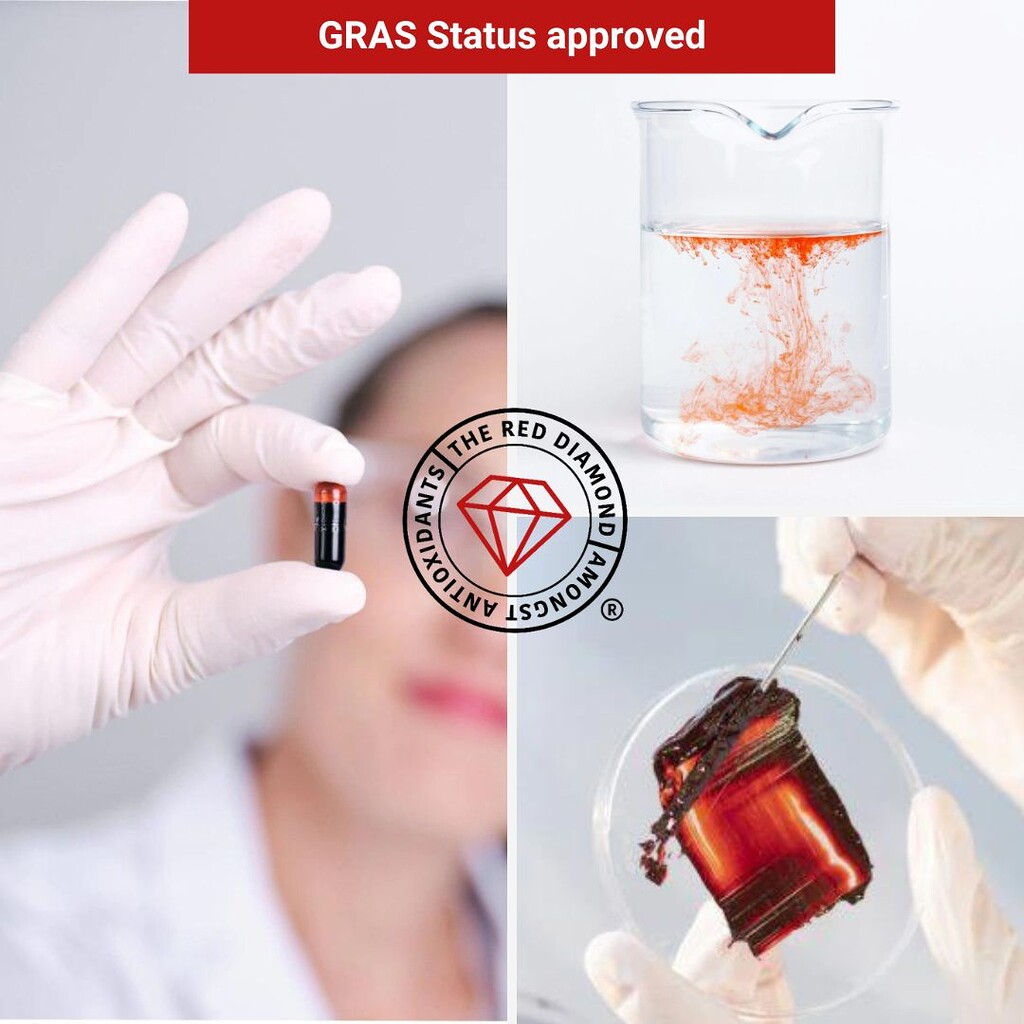Astaxanthin for fertility and pregnancy

Astaxanthin: A natural
Booster for better fertility
Abstract
Astaxanthin is a natural active ingredient from the algae Haematococcus pluvialis and belongs to the carotenoids. The molecule has 40 carbon atoms and a large number of conjugated double bonds. This enables it to transfer electrons particularly efficiently and thus neutralize free radicals.
Due to its special chain length, the structure of its end groups and the number of methyl groups, it has a strong antioxidant effect without becoming a radical itself and being pro-oxidative.
(1-4) Antioxidants such as astaxanthin have very good anti-inflammatory properties and can therefore support the immune system. Numerous studies have confirmed a positive effect of astaxanthin supplementation on the activity of natural killer cells in the body, oxidative balance and inflammation. (5,6) (7)
Micronutrients: Essential for
Health and well-being
Vitamins and trace elements, so-called micronutrients, are essential for a functioning organism and a healthy lifestyle. Optimization of the diet and supplementation with micronutrients, incl. Antioxidants such as astaxanthin are particularly recommended in phases of life such as growth, everyday stress and especially during pregnancy.
Optimal support: omega-3 fatty acids and astaxanthin before and during pregnancy
It is important to get enough nutrients and vitamins before pregnancy. Zinc and B vitamins can increase fertility and promote healthy development and birth.
During pregnancy, women have an increased need for vitamins and nutrients. Omega-3 fatty acids help the development of the baby’s eyes and brain. It is advisable to take them in order to give the child the best possible support.
Maximum support during pregnancy:
Iron and B vitamins for blood formation
The mother’s blood volume rises sharply. Iron and B vitamins help with the production of new blood cells, prevent tiredness and support the thyroid gland. Folic acid and iodine reduce the risk of neural tube defects and promote nerve development.
Astaxanthin: For healthy baby development
During pregnancy, the production of ROS increases, partly due to the functioning of the placenta.
The placenta performs important functions for the baby, such as …
- Food,
- Detoxification and
- Oxygen supply in the first few weeks.
The resulting oxidative stress is associated with the risk of spontaneous abortion and other complications.
Astaxanthin: the natural antioxidant
for healthy pregnancies
Astaxanthin is a powerful antioxidant that can increase the chances of a healthy pregnancy, even at an advanced age.
Studies have already shown the positive influence and safe effect of carotenoids such as astaxanthin during pregnancy and breastfeeding. (8)
Male fertility at risk?
How oxidative stress impairs sperm quality
It can also be difficult for men to reconcile child planning and a healthy lifestyle. Oxidative stress has a negative effect on male fertility. Sperm have a special membrane structure that enables them to move and fertilize. Many unsaturated fatty acids in the sperm envelope make sperm cells susceptible to a lot of ROS and stress through oxidation.
The risk of oxidative stress for sperm:
Why protection against free radicals is important
Since sperm have little protection against free radicals, oxidative stress can lead to a decrease in viability and motility as well as to a change in the overall metabolism of the sperm. (9)
Oxidative stress also causes damage to DNA. Analyses between 1971 and 2011 show a significant decline of over 50% in the sperm count of men from industrialized countries. (10)
Randomized study proves: Astaxanthin promotes fertility in men and women
In a randomized, placebo-controlled double-blind study on supplementation with astaxanthin, an increase in sperm concentration and quality was demonstrated.
In addition, the partners in the astaxanthin group who consumed 16 mg of astaxanthin per day had significantly more pregnancies during the study period. Over half (54.5%) of the partners in the astaxanthin group became pregnant during the study period, compared with only 10.5% in the placebo group. (9)
In addition to increasing sperm concentration, astaxanthin could contribute to an increase in fertility by improving sperm capacitation.
Only through capacitation, the biochemical remodelling process of the sperm cell, is it possible for it to fertilize an egg cell. In vitro studieshave shown that astaxanthin can improve this process with its positive influence on the oxidative balance. (12, 13)
Animal studies prove it: Astaxanthin increases sperm count and motility!
Furthermore, animal studies with typical risk factors for poor fertility showed positive effects in the test group with astaxanthin supplementation: For example, sperm cells from overweight rats fed astaxanthin had a higher sperm count, motility and viability than the sperm of the comparison group. (14)
Another animal study showed that astaxanthin can minimize the harmful effects of nicotine on fertility. In this case, the astaxanthin group also showed increased sperm count, motility and viability compared to the control groups. (15)
Astaxanthin has been researched and administered in horse breeding since the 1990s in order to achieve higher fertility performance and profitability. By improving the motility and protection of sperm, astaxanthin has a positive effect on fertility. (11)
Summary: Astaxanthin boosts male fertility and increases the chance of pregnancy
By reducing ROS, astaxanthin can improve male fertility and thus increase the likelihood of pregnancy. If astaxanthin is combined with other nutrients and vitamins, this effect could be further enhanced. Zinc, selenium, vitamin E and B improve sperm production and motility. This increases the chances of successful family planning.
___________________________
Literature
- Pizzino, G. et al. Oxidative Stress: Harms and Benefits for Human Health. Oxid. Med. Cell. Longev. 2017, (2017).
- Nishida, Y., Yamashita, E. & Miki, W. Quenching Activities of Common Hydrophilic and Lipophilic Antioxidants against Singlet Oxygen Using Chemiluminescence Detection System. Carotenoid Sci. 11, 16–20 (2007).
- Régnier, P. et al. Astaxanthin from Haematococcus pluvialis prevents oxidative stress on human endothelial cells without toxicity. Mar. Drugs 13, 2857–2874 (2015).
- Martin, H. D. et al. Chemistry of carotenoid oxidation and free radical reactions. Pure Appl. Chem. 71, 2253–2262 (1999).
- Park, J. S., Chyun, J. H., Kim, Y. K., Line, L. L. & Chew, B. P. Astaxanthin decreased oxidative stress and inflammation and enhanced immune response in humans. Nutr. Metab. (2010) doi:10.1186/1743-7075-7-18.
- Baralic, I. et al. Effect of Astaxanthin Supplementation on Salivary IgA, Oxidative Stress, and Inflammation in Young Soccer Players. Evidence-based Complement. Altern. Med. 2015, (2015).
- Donoso, A., González-Durán, J., Muñoz, A. A., González, P. A. & Agurto-Muñoz, C. “Therapeutic uses of natural astaxanthin: An evidence-based review focused on human clinical trials”. Pharmacol. Res. 166, (2021).
- Zielińska, M. A., Wesołowska, A., Pawlus, B. & Hamułka, J. Health effects of carotenoids during pregnancy and lactation. Nutrients 9, 1–25 (2017).
- Comhaire, F. H., El Garem, Y., Mahmoud, A., Eertmans, F. & Schoonjans, F. Combined conventional/antioxidant ‘Astaxanthin’ treatment for male infertility: A double blind, randomized trial. Asian J. Androl. 7, 257–262 (2005).
- Levine, H. et al. Temporal trends in sperm count: A systematic review and meta-regression analysis. Hum. Reprod. Update 23, 646–659 (2017).
- Heczko, K. Einfluß der Zufütterung von karotinoidem Astaxanthin auf die Spermaqualität und die Fruchtbarkeit von Warmbluthengsten zur Erlangung des Grades einer ( Dr . med . vet .) durch die Tierärztliche Hochschule Hannover Vorgelegt von Kristin Hildegard Heczko au. (Tierärztliche Hochschule Hannover, 2004).
- Donà, G. et al. Effect of astaxanthin on human sperm capacitation. Mar. Drugs 11, 1909–1919 (2013).
- Andrisani, A. et al. Astaxanthin improves human sperm capacitation by inducing lyn displacement and activation. Mar. Drugs 13, 5533–5551 (2015).
- Mortazavi, M., Salehi, I., Alizadeh, Z., Vahabian, M. & Roushandeh, A. M. Protective effects of antioxidants on sperm parameters and seminiferous tubules epithelium in high fat-fed rats. J. Reprod. Infertil. 15, 22–28 (2014).
- Ashrafizadeh, M. & Ahmadi, Z. Effect of Astaxanthin Treatment on the Sperm Quality of the Mice Treated with Nicotine. Rev. Clin. Med. 6, 1–5 (2019).


